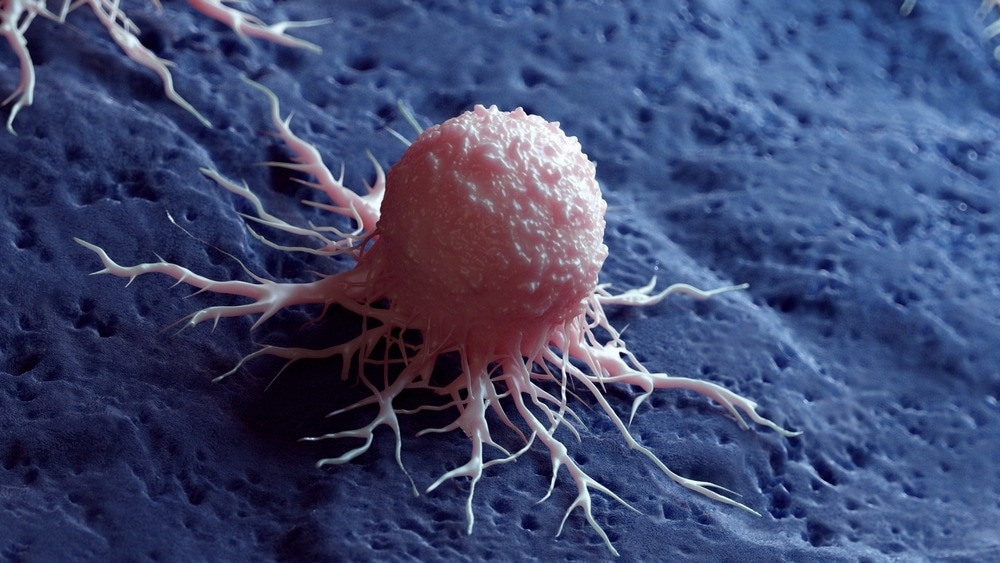Researchers identify SLC13A3 as a key player in tumor cell survival and immune therapy resistance, highlighting its potential as a target to improve cancer treatment outcomes.

Study: Itaconate transporter SLC13A3 impairs tumor immunity via endowing ferroptosis resistance. Image Credit: Sebastian Kaulitzki/Shutterstock.com
In a recent study published in Cancer Cell, a team led by scientists from the University of Michigan investigated the role of itaconate transporters in helping tumor cells escape ferroptosis and lowering the efficacy of immune checkpoint blockade (ICB) therapies.
The study examined how the itaconate transporter SLC13A3 modulated tumor immunity by activating the pathways involved in ferroptosis evasion and contributed to the development of resistance to immunotherapy.
Background
Ferroptosis is a regulated form of cell death that has emerged as an important process in cancer biology, especially because of its links to immune responses and treatment resistance. The use of ICB therapies aimed at boosting the body’s immune response against tumors has shown varying effectiveness across cancers.
One of the challenges in ICB therapies is the development of treatment resistance in tumors, which is possibly linked to their ability to avoid ferroptosis. Moreover, a key factor that influences ferroptosis resistance is the action of specific metabolic pathways that shield the tumor cells from the oxidative damage required to induce this regulated cell death.
Itaconate is a metabolite produced by immune cells in the tumor microenvironment and is believed to enhance tumor survival by preventing ferroptosis. However, exactly how tumors acquire itaconate and utilize it to resist cell death is not well understood.
About the study
In the present study, the scientists examined the role of itaconate transporters such as SLC13A3 in facilitating the uptake of itaconate into tumor cells and potentially enabling tumor cells to evade immune-mediated ferroptosis.
This study employed murine models and genetic cell lines to investigate the role of SLC13A3 in tumor immunity and ferroptosis resistance. The researchers treated cultured tumor cells with ferroptosis inducers such as Erastin, along with itaconate, to investigate ferroptosis sensitivity. The viability of the cells was assessed using flow cytometry. Furthermore, mice lacking SLC13A3 in tumor cells were used to explore immune response changes within the tumor microenvironments, which is essential for analyzing immune cell infiltration and activation.
The study also used clustered regularly interspaced short palindromic repeats (CRISPR)-CRISPR-associated protein 9 (Cas9) technology to knock out SLC13A3 in specific cell lines, and Western blotting was performed to confirm successful knockouts.
Metabolomic assays were used to measure itaconate levels within tumor cells and in the surrounding interstitial fluid. Liquid chromatography-mass spectrometry (LC-MS) was performed to track the uptake of labeled itaconate in tumor cells with and without SLC13A3 expression. The study also included homology modeling and molecular docking analyses to identify potential competitive ligands of SLC13A3.
Results
The study found that the expression of the itaconate transporter SLC13A3 in tumor cells was associated with resistance to ferroptosis, which ultimately impaired immune-mediated tumor suppression.
The results showed that SLC13A3 was involved in importing itaconate into the tumor cells, which activated an antioxidant pathway mediated by nuclear factor erythroid 2-related factor 2 (NRF2) and solute carrier family 7 member 11 (SLC7A11). The activation of the antioxidant pathway protected the tumor cells from oxidative damage and allowed them to evade ferroptosis.
The researchers also found that in several tumor models, high levels of SLC13A3 correlated with poor response to ICB therapy. Furthermore, patients with increased SLC13A3 expression in their tumor cells had shorter overall survival, which highlighted the role of SLC13A3 in limiting the effectiveness of immunotherapy.
The knockout experiments using mouse models also found that the inactivation of SLC13A3 in cancer cells led to enhanced immune cell infiltration and improved tumor control, while the presence of SLC13A3 lowered the immune activity within the tumor microenvironment.
Furthermore, blocking SLC13A3 with specific inhibitors improved ferroptosis sensitivity in tumor cells, both alone and in combination with ICB treatments. The researchers reported that this was achieved by reversing the itaconate-induced ferroptosis resistance, which led to improved T-cell responses and enhanced tumor suppression in the murine models.
Conclusions
Overall, the findings indicated that targeting the itaconate transporter SLC13A3 may offer a promising therapeutic strategy to prevent the development of tumor resistance to ferroptosis and enhance the efficacy of immunotherapy. By inhibiting this transporter, tumors could become more susceptible to oxidative damage and immune responses, potentially improving the outcomes of cancer treatments that rely on ferroptosis induction.
Journal reference:
- Lin, H., Tison, K., Du, Y., Kirchhoff, P., Kim, C., Wang, W., Yang, H., Pitter, M., Yu, J., Liao, P., Zhou, J., Vatan, L., Grove, S., Wei, S., Vigil, T., Shah, Y. M., Mortensen, R., Kryczek, I., Garmire, L., & Sivaccumar, Jwala P. (2024). Itaconate transporter SLC13A3 impairs tumor immunity via endowing ferroptosis resistance. Cancer Cell. doi:10.1016/j.ccell.2024.10.010 https://www.sciencedirect.com/science/article/pii/S1535610824003982